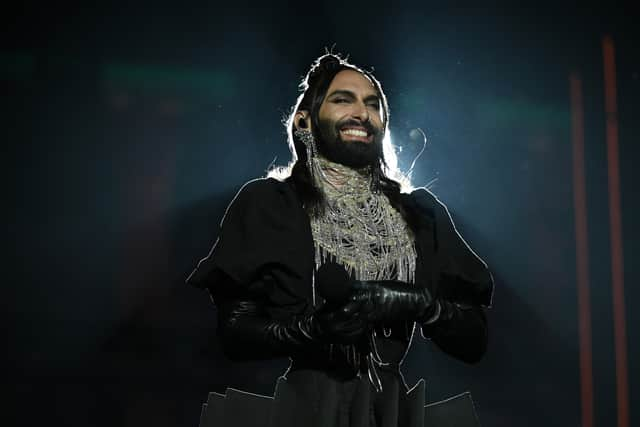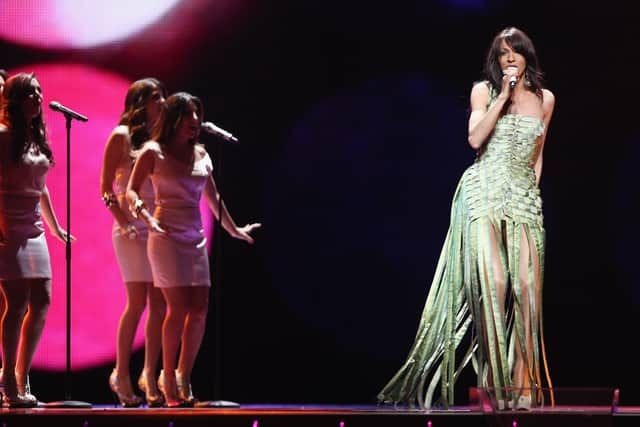A celebration of diversity and inclusion; the relationship between Eurovision and the LGBTQIA+ community
People in this article
and live on Freeview channel 276
As they accepted their Eurovision Song Contest win in 1998 with their song “Diva”, Israeli performer Dana International created history in the beloved competition - becoming the first trans performer to win the competition. Though the win was a first, to say that it launched the relationship between Eurovision and the LGBTQIA+ community would be to demean the competition as a whole - as it would seem that Eurovision has always been an event that embraced tenets of the LGBTQIA+ community long before the arrival of openly-out performers.
The spirit of Eurovision has always been about diversity and inclusion; a raft of different cultures and communities participating in an event that has heavily learned more on the pop spectrum in terms of music than other genres. Try as some might, not everyone is going to have the same success as Lordi or recent winners Kalusch Orchestra, though the enjoyment levels from audiences are completely subjective.
Advertisement
Hide AdAdvertisement
Hide AdDiversity and inclusion happen to also be tenets of the LGBTQIA+ community also; embracing those from communities that differ from the “norm” and celebrating the diversity throughout the rainbow spectrum. Though perhaps not evident from the earlier years of the contest, the more normalised the idea of LGBTQIA+ performers became in performing arts, the less of a “big deal” it became to see openly out performers representing their countries.
Though Dana International was not the first member of the community to compete in the contest; that honour would go to two performers in the 1997 iteration of the event with Iceland performer Paul Oscar becoming the contest's first openly gay artist, meanwhile Katrina Leskanich, who won representing the United Kingdom the same year as lead singer of the group Katrina and the Waves, later came out as a member of the community.
That opened the floodgates of not merely acceptance and tolerance of countries, customs and cultures but now an acceptance of gender identity and sexual preference at the competition that, to be honest, had been deemed a “campy” affair by some of the more cynical music industry types back in the day. Years later, many other open LGBTQ+ artists have competed in the contest including Conchita Wurst, who won in 2014, and Krista Siegfrids, who performed a song about same-sex marriage in 2013.


It’s not just on-stage either where the LGBTQIA+ community have been represented the song contest: several presenters of the Eurovision Song Contest have also identified as members of the LGBTQIA+ community including Assi Azar, who hosted in Israel in 2019, and Nikkie de Jager, who hosted in the Netherlands in 2021. De Jager was the first transgender person to host the contest. Mika hosted the 2022 edition in Italy while the UK’s very own Graham Norton, who took over colour commentary duties after the death of Terry Wogan in 2009, will host the final of the 2023 edition in Liverpool this weekend.
Advertisement
Hide AdAdvertisement
Hide AdEurovision has also found itself a platform for protest and redemption on behalf of the LGBTQIA+ community; in 2017 Croatian entrant Jacques Houdek looked to redeem himself from comments made about the community in 2005. His song, “Celebrate Diversity” with its obvious nod to gay rights. The bizarre yet endearing, and ended with him standing beneath an immense digital rainbow; many read this as a statement of reconciliation, an apology aimed at Croatia’s gay community.
In 2013, Finland's entry, Krista, who is a straight ally, kissed another woman live on stage in protest against her country's failure to extend equal rights to the LGBTQ+ community. Which had led to difficulty for those in certain parts of Europe who might not be part of the community, but certainly embrace the all inclusive feelings that Eurovision set up back in 1956.
In particular, according to TIME Magazine those influenced by Russian attitudes towards the LGBTQ+ community, have also come under the spotlight due to their participation in the competition. When Azerbaijan hosted Eurovision in 2012, the country's record on LGBTQ+ rights was scrutinised. According to TIME, religious extremists threatened to kill homosexual visitors and disrupt the event, but the show went ahead without any major incidents.
Viewers in China also found themselves without access to the grand final locally since 2018, when the rights held by Mango TV were terminated. This was due to censorship by Mango TV during the first semi-final, where the performance of Ireland's Ryan O'Shaughnessy was deemed to go against Chinese guidelines that prohibit "abnormal sexual relationships and behaviours" because of the same-sex dancing.
Advertisement
Hide AdAdvertisement
Hide Ad

Similarly, Albania's Eugent Bushpepa was censored for the open display of tattoos, which broke guidelines around featuring "subcultures" and "dispirited cultures." Following the termination, the Chinese broadcaster was unable to show the second semi-final, the final of the 2018 contest, or any future contest. A no tolerance policy from Eurovision against those with zero tolerance for the spirit and ethos of the event.
To quote the LGBT Foundation, they agree with the sentiments about how the LGBTQIA+ inclusivity fits with Eurovision’s raison d'etre: “It is a unique, warm, generous, uninhibitedly heartfelt unification of European nations that celebrates diversity and love through shamelessly ludicrous, flamboyant spectacle and sentimental song. Ideal conditions for the flourishing of fabulousness.”In 2023, there will be several LGBT community members representing their countries in the Eurovision Song Contest. Belgium's Gustaph, who is gay, will be joined by Norway's Alessandra Mele, who is bisexual, and Serbia's Luke Black, who is gay.
The theme for 2023 is “united by music,” inspired in part due to the unity the competing finalists have towards 2022 winners Ukraine and their continued conflict with Russia. But that theme has always been a foundation for the LGBTQIA’s affinity towards Eurovision for many, many years.
Comment Guidelines
National World encourages reader discussion on our stories. User feedback, insights and back-and-forth exchanges add a rich layer of context to reporting. Please review our Community Guidelines before commenting.
